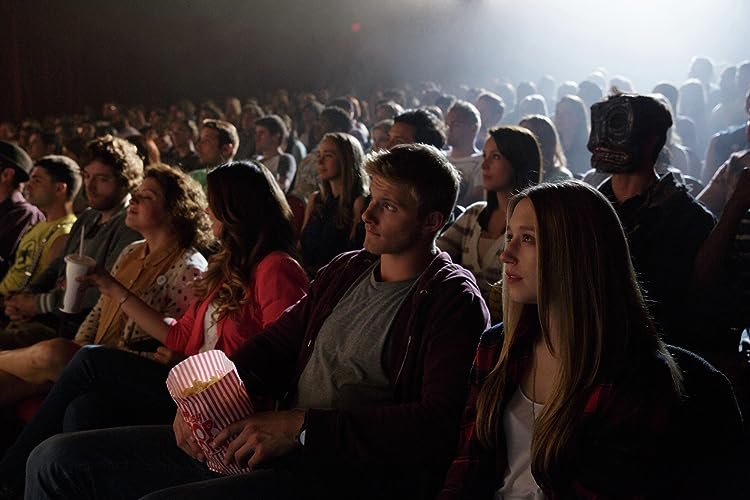– The Final Girls is the movie for the weekend. In this section every Saturday or Sunday Celluloid Dimension picks a movie for the weekend. The selections are preferably underrated movies or neglected movies that we think should get more attention. Have fun with these recommendations. –
![]()
The Final Girls (2015) Directed by Todd Strauss-Schulson
Most of the playfully anachronistic facets of this entrancing tribute to 80’s slashers are cheap demagoguery, looks tacky and has a counterproductive reliance on its dated paraphernalia; however, and I want to emphasize this, it has a lot of heart, it is made with a muscular passion that overcomes its limitations and imperfections by following only its intuitive, resonant gut feeling that tells them, they’re doing the right thing. It can be seen as a visceral deconstruction of slasher cinema as much as it can be seen as a celebratory travesty of the genre. Either way, this silly, sappy depiction of the quintessential 80s genre mumbo jumbo quickly captured my heart, and I’m not ashamed to say so. It’s immensely manipulative, yet its funky spirit and cheeky attitude successfully rubs off on you; it possesses you. The story of the conception of this film is almost as buggy as the materialization of this one. Joshua John Miller, son of the great Jason Miller aka Father Karras, and M.A. Fortin wrote the screenplay for this film. The bizarre meta-narrative ideas blossomed from Joshua Miller’s personal experiences of watching his father die fictitiously many times in William Friedkin’s classic The Exorcist. It may sound odd as a creative template for a film but trust me it functions on unexpected emotional proportions.
The heroine of the film is Max Cartwright (Taissa Farmiga), who is the daughter of the most famous eighties scream queen Amanda Cartwright (Malin Akerman), star of an atrocious but memorable 1986 slasher film called Camp Bloodbath. For Amanda, getting a role outside of the horror spectrum is now impossible because her reputation is tied to her status as an ’80s exploitation icon. Her daughter is a circumspect young girl who has a personality diametrically opposed to hers, yet the two have an affable mother-son relationship, they are empathetic with each other. Alas, a fatal car accident ends Amanda’s life, leaving Max orphaned, who still lives with a deep sorrow after that tragedy. Three years later, she finds herself in a movie theater packed with people gathered to commemorate the anniversary of the popular movie in which her mother starred. The next act, Max and his friends are trapped in an alternate reality from which they cannot escape, this bewildering yet familiar dimension is that of Camp Bloodbath. Now with this information, linking analogies to Joshua Miller’s inspiration for writing this story is easy. Evidently, the whole exercise has deconstructive goals, it is an outrageously comedic dissertation of 80’s slasher filmmaking, but it is also a blistering meta-narrative introspection of cinema and the power it has to affect us on deeply intimate emotional grounds. This torrid trip-into-a-movie directed by Todd Strauss-Schulson traverses the most hackneyed tropes of 80’s slashers, though it never leans towards being burlesque, the overblown direction overdoes the sleazy grindhouse humor seeming to engage in something more farcical than celebratory. Therefore, the storytelling suffers from overindulgence in being over the top in something already excessive, pardon the redundancy but that’s what occurs in its far-fetched slasher spoof. At times the storyline can feel hokey, but its theory never fails to be consistent; notably in each invigorating segment where it dwells on the mimetic interplay of reality with fiction, and vice versa.
It is a deliberate romp of moviemaking amateurism that mirrors many of the genre’s deficiencies yet does not criticize them, but rather purposefully flaunts its aesthetic incompetence to illustrate how its shoddy and fanciful format works precisely because of those criticized aspects. Authentically, it is remarkable how the film manages to be unremittingly referential without being boringly pretentious. The characters, all of whom embody the classic archetypes of 1980s slasher cinema. The grotesque aesthetic, which alludes to the visual configurations of slasher fare. And the gratuitous sleaze, which epitomizes the genre’s ubiquitous horny philosophy. Each of these overlapping layers articulate constant references to various cult classics of horror exploitation cinema. The only element antithetical to slasher conventions would be the sheer emotionalism that permeates every scene where we see Max and her mother in tearful melodramatic melancholy. When I specified that this film is crafted with heart, I wasn’t particularly referring to this emotive omnipresence, nonetheless it is one of the enormous persuasive tools this comedy has to ensnare and engulf you in its lachrymose character development. Taissa Farmiga’s awesomely sensitive performance is compelling and heartfelt, much of the mushy effectiveness the film proudly exhibits is due to her, who provides a non-cliché rendition of the so-called final girl in the realm of slashers; she’s probably the only one who takes her role as the emotive engine of the plot earnestly. I’m thrilled to know that in the midst of 2015 there were filmmakers willing to be as serious as they are goofy and who have dared to discuss the past with modern insights without being judgmental, just delightfully irreverent. I must admit that I was foolishly anticipating something extremely frivolous and absurd, it is absurd, but absurdism has never looked so insanely funny in gore, saccharine and cinema, and yet be so bizarrely enthralling.



